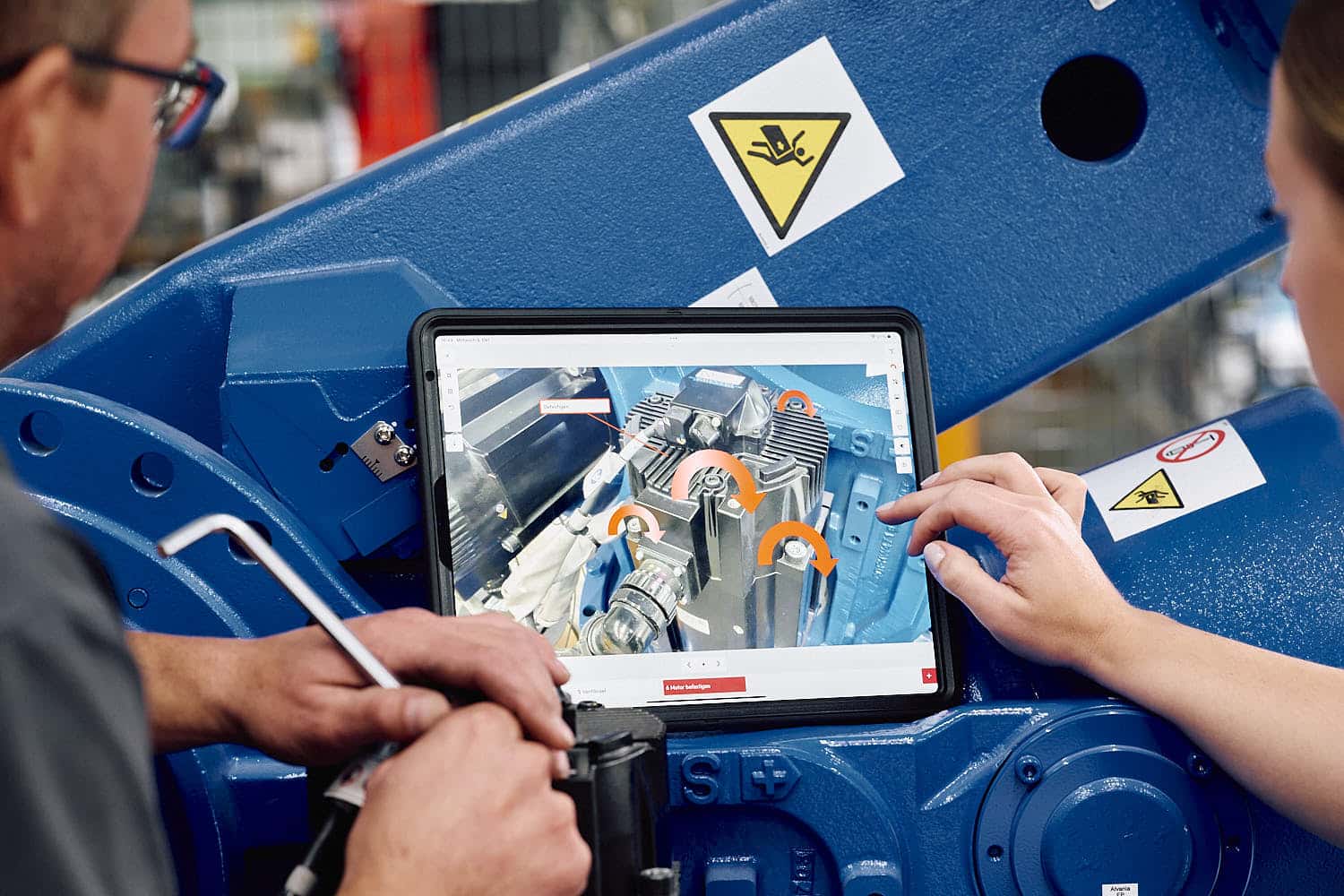Inhaltsübersicht
- 1 Production software
- 2 Definition of production software
- 2.1 Digital production planning and control: production software or ERP software?
- 2.2 Production planning for all industries and company sizes: Who needs production software?
- 2.3 Indispensable in every manufacturing company: ERP software
- 2.4 Finding the right ERP system for your own company
- 2.5 Functions of the production software
- 2.6 How the "instructor" supports manufacturing companies
- 2.7 tepcon is your partner for innovative digitization solutions
- 3 FAQ: ERP software for production
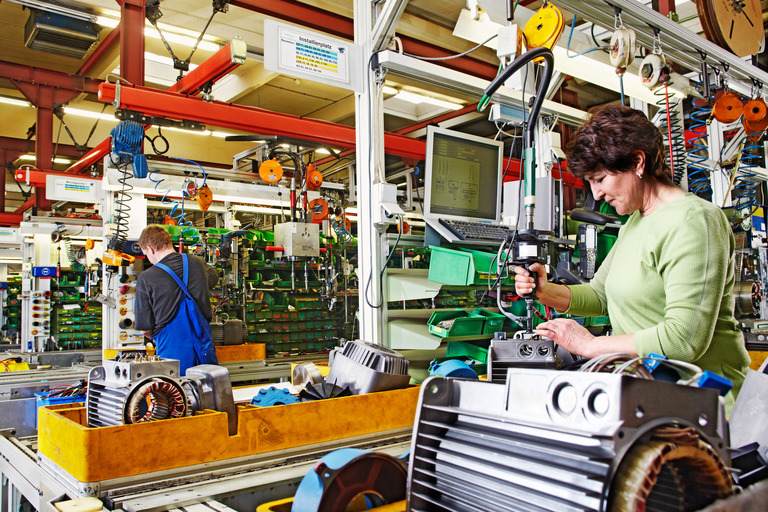
Production software
Production planning for advanced users: manufacturing software and its importance for production and companies
Digitalization is advancing at a rapid pace in the industry. Modern manufacturing software plays a key role when it comes to efficiently planning, controlling and continuously optimizing production processes.
Whether small and medium-sized enterprises (SMEs) or large manufacturing companies: The requirements for flexibility, transparency, efficiency and resource conservation are constantly increasing. Well thought-out, sensibly selected production software helps to meet these requirements and forms the digital backbone of modern industrial companies.
Solutions that can be seamlessly integrated into existing IT landscapes are particularly powerful – our tepcon “instructor“, the intelligent tool for digital work instructions, assembly instructions and service documentation, is a valuable addition to your individual ERP software.
Definition of production software
Production software, also known as manufacturing software, is a collective term for software solutions that support, control and monitor manufacturing processes. It helps to use resources efficiently, plan materials as required, coordinate production orders and optimize production processes.
The software includes functions such as production planning and control (PPS), inventory management, material availability, warehouse management, automation of work steps as well as real-time monitoring and evaluation of production.
Modern production software can be operated independently or as part of a comprehensive ERP system. It plays a central role in production, especially in companies that have to manage a large number of products, many variants or complex processes.
The area of application ranges from discrete one-off production to process-oriented series production. The aim of using such software is always to increase productivity, reduce the error rate and increase transparency in the production process.
Digital production planning and control: production software or ERP software?
The terms production software, manufacturing software and ERP software are often used interchangeably. However, it is worth taking a closer look:
Production software focuses on the direct processes of production, i.e. the planning, control, monitoring and optimization of production processes.
Manufacturing software is a closely related term that is used particularly in industrial environments. It addresses technical, logistical and organizational challenges along the production process.
The abbreviation ERP software (Enterprise Resource Planning), on the other hand, is more comprehensive: it links all areas of the company, from production, warehousing and purchasing to sales, controlling and HR. Production planning and control is only one area here.
Not every ERP system is suitable for production. Companies that have specific production planning requirements should rely on ERP solutions with industry-specific extensions or integrative manufacturing software.

Production planning for all industries and company sizes: Who needs production software?
Modern manufacturing software is indispensable for almost all manufacturing companies – regardless of their size. SMEs in particular benefit from modular solutions that can grow and be individually adapted.
Typical industries for which the market offers comprehensive ERP software solutions are, for example:
- Mechanical and plant engineering
- Automotive supplier
- Electrical engineering
- Metal processing
- Food production
- Chemistry and pharmaceuticals
- Medical Technology
Service companies with technical processes can also benefit from the digital planning and control of their processes using suitable software.
ERP software for SMEs: digital support for production in modern SMEs
Small and medium-sized companies in particular face special challenges when introducing an ERP system: limited personnel resources, tight budgets, high demands in day-to-day business and uncertainties regarding the right choice.
Many entrepreneurs fear that the introduction of ERP software is time-consuming and cost-intensive, that employees will be overwhelmed and that existing processes could be massively disrupted. There is also the concern that the investment will not pay for itself quickly enough or that the solution and its functions will not suit the company’s individual situation.
But despite these concerns, practice shows that an ERP system is also – and especially – worthwhile for SMEs. Because with suitable ERP software, central business areas such as production, warehousing, procurement, material planning and production control can be efficiently linked together.
The software brings transparency to all relevant processes, reduces manual work steps and enables well-founded control of resources, products and quantities in production. Modern solutions are no longer rigid monoliths, but flexibly configurable tools with exactly the functions required for the respective production and company size.
A key advantage is that data from different areas – from stock levels to manufacturing processes and production planning – are brought together in a central system. This gives companies a clear overview of their processes and allows them to react more quickly to changes. Automation and standardization increase efficiency, minimize sources of error and improve planning reliability.
The creation of evaluations or parts lists is also simplified with a solid ERP system.
Conclusion: For SMEs that want to hold their own against the competition, digital support from an ERP system is no longer a luxury, but a decisive factor for sustainable success.
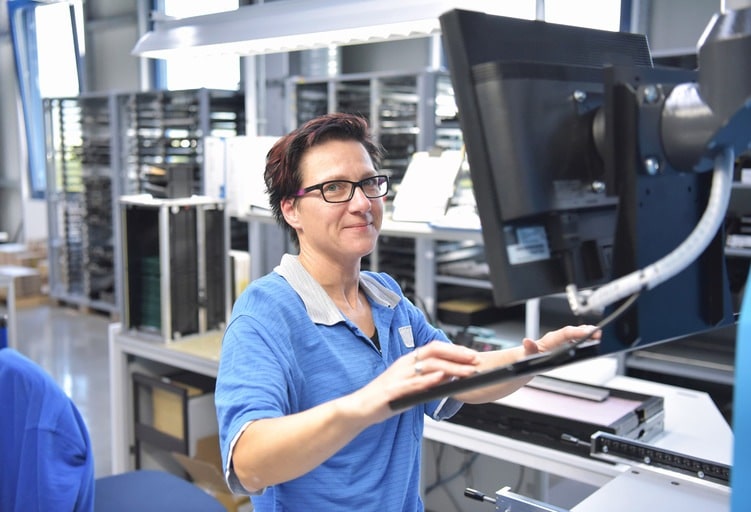
Indispensable in every manufacturing company: ERP software
Industry-specific ERP software is a key tool for ensuring competitiveness and efficiently managing complex processes.
Compared to generic ERP solutions, specialized systems offer functions that are precisely tailored to the requirements of manufacturing companies – for example in production control, warehouse management, material requirements planning or the creation of production orders.
The requirements differ considerably, especially for different types of production such as discrete manufacturing (e.g. in mechanical engineering) or continuous process production (e.g. in the chemical industry). Suitable ERP software provides targeted support for the respective processes and ensures smooth workflows.
Finding the right ERP system for your own company
Choosing the right ERP solution is a strategic decision. It depends on many factors, including company size, industry, budget, complexity of processes, degree of digitization and required interfaces.
Aspects such as flexibility, scalability and integration capability also play an important role when deciding on suitable software.
What is needed in your production, in your company? A good ERP system supports real-time data transfer, enables seamless integration into existing infrastructures and offers tools for evaluations, warehouse management, inventory management and production control.
Tip: During the selection phase, companies should define specific requirements and compare them with ERP providers. Requirements specifications, functional specifications and test systems help with this.
Functions of the production software
Good, individual manufacturing software offers a wide range of functions that support production companies in planning, implementing and optimizing their processes.
The following functions are important, for example
- Production planning and control (PPS): planning of production orders, scheduling, capacity balancing
- Resource management: management of materials, personnel, machines and tools
- Materials management: material availability, stock levels, reordering, storage locations
- Order processing: control and tracking of production orders
- Quality management: control, test steps, documentation
- Traceability: batches, serial numbers, processes
- BDE/MDE: Production and machine data acquisition for the analysis and optimization of production
- Interfaces: ERP, CAD, MES, PLM, IoT
These functions ensure transparency, control and efficiency in production planning – and are a key success factor for SMEs in all industries and sectors.
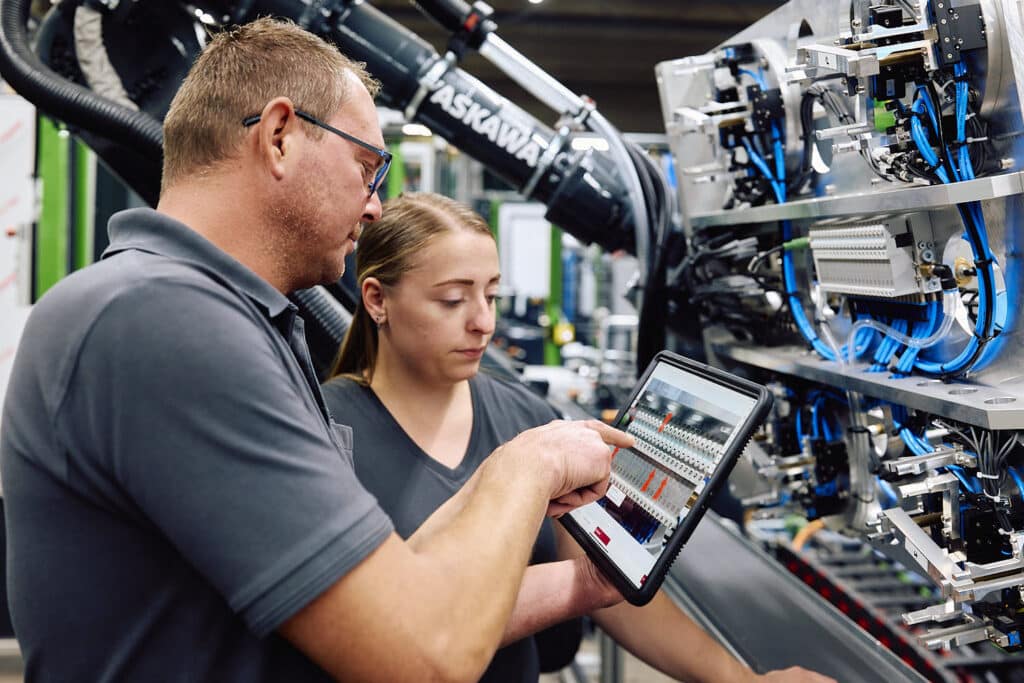
How the "instructor" supports manufacturing companies
With the tepcon “instructor”, we provide an intelligent software solution that creates and manages digital work instructions, assembly instructions and service documentation.
Our goal? We want to make production processes more efficient by providing clear, standardized and digitally accessible information: In this way, tepcon accompanies customers from a wide range of industries into a more digitized future and a competitive position in the respective market.
More efficient processes, automated documentation, fewer problems: the functions of the tepcon "instructor" in ERP
Depending on requirements, ERP systems can become quite complex and consist of numerous components. As a digital tool for work instructions, service documentation and assembly instructions, the tepcon “instructor” offers numerous functions that help you to optimize production and streamline processes.
Checklists and forms, workflows and orders are stored here clearly and accessible at all times. The ticket system simplifies error analysis and rectification.
Thanks to different modules and variants, the “instructor” can be customized for your company. If you map different product variants in a single instruction manual, you only ever provide the team with the instructions they need for their specific variant.
All instructions can be found using a QR code or barcode – or you can send them as a link via email, Teams or other messengers. All processes and every step in the production order can be documented automatically: This is another way in which the “instructor” reduces the workload in all work steps that would otherwise have to be laboriously documented by hand.
The “instructor” can be flexibly integrated into existing ERP systems or other software landscapes via standardized REST or GraphQL interfaces. This means it is not an isolated solution, but a powerful module in the digital ecosystem of manufacturing companies.
Whether to support new team members, to document safety-relevant work steps or to optimize maintenance processes – the “instructor” brings structure to complex workflows. The simple creation and distribution of information saves time, avoids errors and improves productivity in the long term.
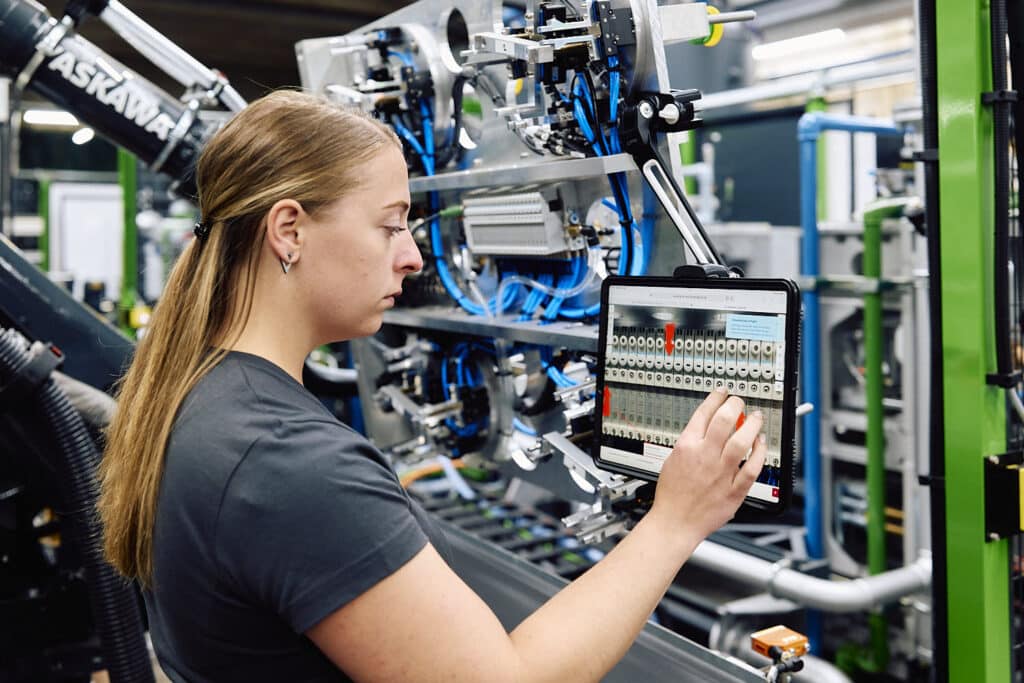
tepcon is your partner for innovative digitization solutions
At tepcon, we see ourselves as a strong partner for companies that want to drive their digitalization forward in a targeted manner. With the “instructor”, we offer sophisticated tools for industrial applications, especially for SMEs and manufacturing companies. Our vision is to make technological change tangible for our customers and accompany them on their journey with practical tools.
What can this look like for your company?
Let us show you our demo version and get in touch with our customer advisors!
Would you like to digitize your production processes, simplify work instructions or expand your ERP environment in a targeted manner? Discover the “instructor” – the software for digital work instructions that adapts flexibly to your requirements.
FAQ: ERP software for production
In modern industrial production, specialized ERP systems are used that have been specially developed for the requirements of manufacturing companies. This ERP software supports central processes such as production planning, production control, warehouse management and resource allocation.
In addition to classic ERP modules for purchasing, sales or accounting, ERP solutions for production often include additional functions such as production order management, parts list management, material requirements planning (MRP) or BDE/MDE interfaces for machine and production data acquisition.
The use of such software enables companies to centrally record and evaluate all relevant production data and make it available for decision-making – in real time.
A production program describes the quantity and timing of the products to be manufactured within a specific planning period. It is a central element of production planning and is based on a company’s sales forecasts, customer orders or stock targets.
In an ERP system, the production program is automatically created, continuously updated and coordinated with other areas of the company such as purchasing, warehousing or sales. Based on the available resources, materials and capacities, the software calculates which products can be produced when and in what quantities.
This avoids over- or underproduction, bottlenecks or unnecessary stock levels.
The selection of the right system depends largely on the size of the company, the manufacturing processes and the organizational complexity. Small manufacturing companies benefit from lean, modular ERP solutions that focus on the essential functions, such as production control, warehouse management and order management.
Medium-sized companies usually require more comprehensive systems with integrated functions for evaluating large volumes of data, for detailed planning or for linking with other areas of the company.
Larger production companies often rely on highly scalable ERP software with extensive interfaces to third-party systems and individual customizability. In any case, the system should fit your processes and products – not the other way around.
Yes, many ERP providers now offer solutions that are specifically aimed at small and medium-sized companies in the manufacturing industry.
These systems are often cloud-based, can be implemented quickly and offer exactly the functions that are relevant for managing production and the warehouse – without unnecessary complexity. These include the management of production orders, article master data, resource planning and inventory management in the warehouse.
The advantage: even smaller companies benefit from digitally supported production processes and central data storage without overburdening themselves organizationally or financially.
The search for the right ERP provider should be structured. The first step is to precisely define your own requirements: Which functions are absolutely essential for your production? Which articles or products should be mapped? How complex are your processes? How important are warehouse management, evaluations, interfaces or industry-specific extensions?
You can then search specifically for ERP providers that specialize in companies of your size and industry. Pay attention to references, customer reviews and the possibility of a test phase. A good provider will take the time to answer your questions, offer a transparent introduction and support you as a long-term partner.
ERP systems create transparency across all relevant areas of the company and enable end-to-end control of your production processes.
With powerful ERP software, you can use your resources more efficiently, plan material availability better, optimize stock levels and use data to make informed decisions. Sources of error in production control can be minimized through automated processes, while at the same time the ability to react to customer requests or market changes increases.
Even complex production processes become clearer and more controllable with digital support. Investing in a suitable system not only pays off in terms of increased efficiency – it also gives you a decisive competitive advantage in an increasingly data-driven market environment.
Whether you run a small manufacturing company or an established production company with grown structures – choosing the right ERP software is a strategic step with far-reaching consequences.
Take your time for the selection, analyze your processes and requirements and choose an ERP provider that speaks your language and understands your industry. The benefits for your production, customer relationships and internal processes are enormous – provided the system fits your company and grows with your goals.


